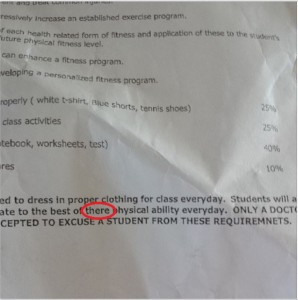
Copyright: alexmillos / 123RF Stock Photo
There is some confusion over when to capitalize personal titles. Here are the “rules”:
- Capitalize official titles of honor and respect when they precede a personal name
- Personal Titles—Mr. John Jones
- Executive Titles—President Hank Brown
- Professional Titles—Professor Sue Allen
- Civic Titles—Councilman Frank Thomas
- Military Titles—Sergeant Sharon Smith
- Religious Titles—Bishop Samuel Stone
- Do not capitalize these titles when the personal name follows, set off by commas, as a description of the title
- The professor, Sue Allen, teaches on Wednesdays and Thursdays.
- The president, Hank Brown, is in meetings all day today.
- Do not capitalize occupational titles when they precede a name.
- The work of attorney John Jones is full of grammatical errors.
To determine whether it is an official title as opposed to an occupational title, decide if you can use the title with just the last name. You would not say “Lawyer Jones,” “Director of Marketing Smith,” etc. Do not use a title before a person’s name unless it is short and you would actually say the title when you address that person. For instance, you might say Professor Allen, but you would not say Professor of Literary Arts Allen. Instead, that sentence would start “Sue Allen, professor of literary arts, . . .”
- When you have a title that would be capitalized, be careful not to confuse it with a more generic expression that would not be capitalized:
- Judge John Jones
- BUT NOT: Federal Judge John Jones or federal Judge John Jones
- Generally, you would not capitalize titles of honor and respect when they follow a personal name or are in place of a personal name:
- Hank Brown, president of XYZ Corporation, attended the meeting this morning.
- The president of XYZ Corporation attended the meeting.
- Jerry Hawkins, director of ABC Corporation, was the only dissenting vote of the board of directors.
- The directors of ABC Corporation voted on the CEO’s pay increase.
However, when that title is for a high-ranking national, state, or international official and follows or replaces the personal name, it is capitalized:
- Chuck Hagel, Secretary of Defense
- Ambassador John Phillips
Modern usage is even changing parts of this rule. Some sources now recommend that these titles not be capitalized when they follow or replace a proper name of a high-ranking official as in “The queen will visit the prime minister of Australia during her visit there.” If you will use this style, remember to give both officials the same treatment so that “queen” and “prime minister” are both not capitalized. The same rule applies when using two high-ranking officials with their position and name, i.e. “Queen Elizabeth will meet with President Obama in Washington, D.C.” NOT “Queen Elizabeth will meet with the president.” Just use equal treatment.
- Titles of organizational officials are generally not capitalized when they follow or replace the officer’s name EXCEPT in formal minutes, rules, and bylaws.
- The director of membership is responsible for greeting new members.
- The President called the meeting to order at 6:45 p.m. (In formal minutes.)
- Do not capitalize job titles when they stand alone. In someintercompany memos and announcements, the title may be capitalized for special emphasis.
- Please join us in congratulating John Jones, who was promoted to Paralegal Manager today. (Interoffice announcement.)
- Please see the paralegal manager for your next assignment.
- Do not capitalize titles when you are using it as a general term of classification
- all of the senators
- the kings
HOWEVER, because of the special position of the President of the United States, that title is always capitalized even when used as a general term of classification
- all U.S. Presidents
In a letter’s inside address, writer’s signature block, envelope, and on business cards, the titles are ALWAYS capitalized whether they are before or after the proper name.
I hope this helps clear up some confusion in using personal titles correctly.


 Follow
Follow






 When a father and son have the exact same name (first, middle, and last) the son would use Jr. and the father would use Sr. If a son/grandson continues with the same exact name, the grandson would use III and father and grandfather could continue using Jr. and Sr. or could change to II and I, respectively. The Roman numeral designation II can also be used where a child is named after another relative like an uncle or grandfather. Royalty would always use the Roman numeral designations. The issue comes with whether or not to use a comma. According to the Gregg Reference Manual, the trend is not to use a comma to set off those elements, but the person’s preference should always be respected. If you know that the person prefers the comma in their name, follow these rules:
When a father and son have the exact same name (first, middle, and last) the son would use Jr. and the father would use Sr. If a son/grandson continues with the same exact name, the grandson would use III and father and grandfather could continue using Jr. and Sr. or could change to II and I, respectively. The Roman numeral designation II can also be used where a child is named after another relative like an uncle or grandfather. Royalty would always use the Roman numeral designations. The issue comes with whether or not to use a comma. According to the Gregg Reference Manual, the trend is not to use a comma to set off those elements, but the person’s preference should always be respected. If you know that the person prefers the comma in their name, follow these rules: